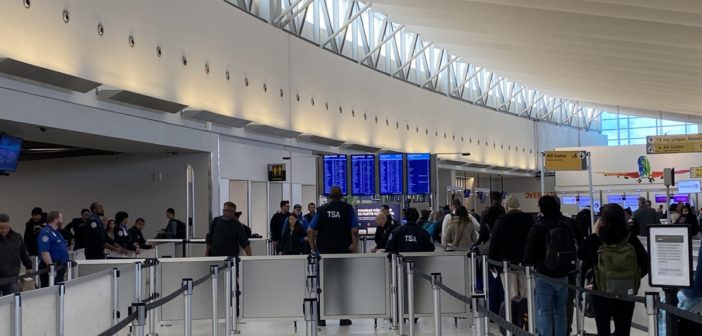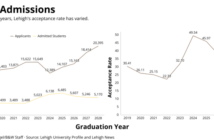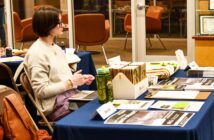It was 6:30 a.m. as the sun rose above the Ponte Vecchio, a medieval bridge that stretches across the Arno River in Florence, Italy. For Sally Solomon, ‘21, and her friends, it was their last sunrise in the capital city of the Tuscany region.
A few hours later, Solomon boarded a flight to Paris, where she changed planes and flew to John F. Kennedy International Airport in Queens, New York. She was coming home.
Solomon, a native of Long Island, was one of many Lehigh students forced to abandon their study abroad program in Italy, which had become the center of attention for the spread of coronavirus in Europe. As of March 6, Italy’s Civil Protection Authority has reported that 4,636 people tested positive and 197 people have died from COVID-19, the disease caused by the virus.
Italy has the fourth-highest confirmed cases of the virus in the world, behind Iran, South Korea and China, which has 80,651 cases, as of March 6. There are 102,188 confirmed cases globally, spread across 89 countries since originating from the now-quarantined Wuhan in China’s Hubei Province.
The virus has disrupted many aspects of life since it’s discovery on Dec. 8, 2019. According to the Centers for Disease Control and Prevention, the World Health Organization on Jan. 30 declared the outbreak a “public health emergency of international concern.”
A deteriorating situation
Things started to unravel during the last week of February. Solomon was in Nice, France, during a spring break trip with Emily Ferrera, ‘21, Blair Haworth, ‘21, Erica Shapse, ‘21, and Julia Blauner, ‘21. The five girls lived together in Florence with Maddie Phillips, ‘21, and Kristen Finley, ‘21.
While in Nice, Solomon had been carefully monitoring reports of American universities pulling the plug on study abroad programs in Italy.
“A lot of schools with students in Florence started sending kids back home,” Solomon said. “We were not really concerned with getting coronavirus, but it was more of a concern of being stuck in Florence or quarantined in an apartment for weeks.”
Ferrera, a native of New Jersey, said she was planning to go to Paris from Nice when she got a phone call from her mother. All the parents had been monitoring the situation and communicating with each other, keeping the girls updated in a group chat.
On Wednesday, Feb. 26, they flew back to Florence from Nice, cutting the trip short. The families had decided it would be best for everyone to get on flights the next day to go back to the United States, before the abroad program was officially canceled.
Solomon said her friends all wanted to be on the same page as each other, and said their families were worried about possible quarantines, or even not being able to reach their children in the event that they would fall ill.
“As an abroad student, it was hard for me to accept the decision to leave, because when we got back to Florence, everything seemed normal,” Solomon said. “It didn’t seem like they were in panic mode. It felt like I was voluntarily leaving.”
Solomon said it was concerning that Milan, which had become the focal point of the virus in Italy, was only two and a half hours from Florence. She said there was a hysteria, but her friends had been trying to take it day-by-day and see how the situation progressed.
But she said each day, more cases started to appear closer to Florence.
“We didn’t think we would actually have to leave — our parents thought we would get stuck in Italy,” Ferrera said. “I had one day back in Florence to pack. My mom booked the last two seats (on the flight) for my friend and I to come home… Everyone that didn’t come back is in Florence having a hard time booking flights.”
An inevitable decision
On Thursday, Feb. 27, Solomon, Haworth and Ferrera were back on U.S. soil. Solomon said when she landed at John F. Kennedy International Airport, nobody acknowledged the fact that she was in Italy for two months. She said she walked to customs, had her passport looked at, and was told to have a good day.
“It was a quick turnaround and we had to wear the masks on the plane, even though they didn’t do anything,” said Haworth, who is also from New Jersey.
Ferrera said she was fearful of coming back to the U.S. and being quarantined, but Haworth said not a single question was asked about their travels to Italy. The two were interviewed by CBS upon arrival at the airport.
Ferrera said she was surprised nobody at the airport made any gesture toward the fact that she was coming back from Italy.
For the past few weeks, however, every time Solomon, Haworth and Ferrera flew back to Italy from some other city, they said they were met by people in the airport wearing hazmat suits, taking temperatures immediately upon passengers’ disembarkment.
“I didn’t think I was going to get the virus — when I was flying from Nice back to Florence, and Florence home, I was definitely being very aware. We all bought hand sanitizer and vitamin c, washing hands a lot and being very cautious,” Solomon said. “Everyone around us was wearing masks — it was very scary — definitely was nervous I was gonna get (the virus), but I never had an experience with someone coming in direct contact, that would make me think I was gonna get it.”
As it turns out, they were one step ahead of everyone else. A Feb. 28 email from Katie Radande, Lehigh’s Study Abroad director, cited the CDC and U.S. Department of State travel advisories being raised to a level 3 “Avoid non-essential travel” for Italy. Radande said in the email this is a Lehigh threshold for assessment, and a threshold used by their overseas partners in Italy to alter or cancel programs.
The next day, the plug was pulled. A Feb. 29 email from CAPA International Education, based in Boston, was sent to students of CAPA Florence, the program that Solomon, Haworth and Ferrera were on. The email said there was no choice but to suspend the in-country portion of the program, directing students to make arrangements to fly back to the U.S. and continue their program coursework remotely through CAPA’s Globally Networked Learning Platform.
“No one could tell the future. For all I know, it could be fine in a week, or I could have been quarantined. Better to be safe than sorry — clearly the decision I made was inevitable,” Solomon said. “It came to a point where we were laughing — we’re sitting there packing and we felt like we just got there. It didn’t feel real and it felt like it was happening so quickly.”
Managing a crisis
Back in South Bethlehem, there is plenty happening across campus to facilitate the process of students coming back from Italy.
“We’re all working across campus to help the students transition back,” Radande said. “A lot of initial contact is through International Affairs, Registration (and Academic Services), the dean of students, Housing, the Health Center — so it’s actually a campus-wide response. And the colleges are involved in credits.”
Radande said students have the option to come back to campus, with the approval from the Health Center. Housing has been made available and housing fees are waived. She said the Office of International Affairs is working with Registration and Academic Services to ensure students can take their abroad courses online — and if they can’t, they’re looking at ways Lehigh can fill credits.
She said the Office of International Affairs is working with Housing Services to coordinate where students who are coming back to campus will live.
“Students returning from travel to countries that the CDC has designated as Warning Level 3 (which now includes Italy) are being directed to contact Lehigh’s Health and Wellness Center and to self-monitor at home for 14-days remaining in contact with the Health and Wellness Center,” said Lori Friedman, Lehigh’s director of media relations, in an email. “After the 14-day self-monitoring period, the Health and Wellness Center will assess and make a determination about a return to campus.”
In the email, Friedman said at this time, most programs in Italy are continuing online, and Lehigh is working with students to facilitate their continuing participation online. She said the university is working with students, their families and departments across campus to make sure there is as little negative impact as possible on students’ academic pursuits and credits.
Lehigh staff are in constant communication with the students returning from Italy study abroad programs and their families to provide support and guidance, and the situation is rapidly evolving, Friedman said in the email.
“We are also in ongoing communications with national, state and local health authorities, following their guidelines and receiving updates in order to safeguard the health and safety of the returning students, their families, the campus community and the community at-large,” Friedman said in the email.
Lehigh News posted a March 2 update online that says the university is closely monitoring the global outbreak of the coronavirus. The update said Lehigh programs in China and South Korea for summer 2020 have been suspended, but all other summer programs are expected to run at this point.
Abandoned plans
Along with the chaos that came with the virus, plans had to be cancelled. A hotel in Dublin. An Airbnb in Paris. Festival tickets in Barcelona. Flights around the continent. Ferrera’s family was even planning a two-week trip to Europe this spring.
“Everything was booked — that’s gone and wasted,” Ferrera said.
She said she left so abruptly, she missed the opportunity to say goodbye to friends from the University of Colorado Boulder who were traveling at the time.
Solomon said she had seven flights booked and was eager to explore cities like Barcelona and Vienna. Tickets to various museums in Amsterdam like the Heineken Experience, Van Gogh Museum and Anne Frank House were already paid for.
“Nothing is getting refunded,” Solomon said. “A lot of the airlines we booked on were cheaper airlines. There were apps to book through with cheaper flights — you can’t anticipate something like this is gonna happen.”
She said she reminded herself that Europe isn’t going anywhere, and that she is able to visit again.
But living in a country — having restaurants she went to, her gym, everyday activities and places to go home to — that’s what she was going to miss the most.
“It was an experience that I probably won’t get again, so that was probably the most heartbreaking to me,” Solomon said. “Getting on the plane home, it didn’t really occur to me that it was happening. It happened so fast, I didn’t process it until we went home.”
Haworth said she was able to get money back for some accommodations, but not for discount flights on airlines like Ryanair or Easyjet. She said all the activities or travel planned for the warmer months just couldn’t be done anymore.
She said a few friends from Lehigh were planning on visiting the girls in Florence, which, of course, had to be canceled.
“I was upset to leave because I feel like we were robbed of the experience,” Haworth said. “Even though we were there for six or seven weeks, we still had a lot to look forward to.”
Quarantine in Tel Aviv
Students in Italy weren’t the only ones who felt the effects of the virus from traveling. Dani Sontag is a junior at the University of Wisconsin studying abroad in Tel Aviv, Israel, for the semester. With her roommate Amanda Leitman, a University of Michigan junior, Sontag traveled to Florence to visit Solomon from Feb. 20 to Feb. 23.
When the Long Island natives returned to Ben Gurion Airport early on Feb. 24 to resume their abroad program, all seemed normal. A few days later, they received a notice from the Israeli government, saying based off the travel form the girls had filled out, the Ministry of Health mandates a 14-day home quarantine from the time they left Italy.
Shortly after, they were made aware of an online posting by the Ministry of Health, clarifying that a violation of the quarantine order may result in criminal charges. Violators could face up to seven years in prison if it was intentional, and up to three years in prison if it was negligence.
After realizing their dorm wouldn’t suffice for a two-week stay, comparing it to “a box,” the duo snagged an Airbnb in Tel Aviv and stocked up on supplies at the local supermarket.
“They told us we were excused from classes and we had to fill out a government form — an address of our home quarantine, how many people are in the apartment and how many rooms there are,” Sontag said.
To keep busy, Sontag and Leitman have been binge watching television shows, tanning from inside and doing workout videos to keep active. They said any future plans to travel to Europe, like the upcoming trip to Dublin for St. Patrick’s Day, have been canceled.
Their quarantine ends March 9.
A confusing semester
Now back in the States, Solomon, a psychology major with a marketing minor, Haworth, a marketing major, and Ferrera, a finance major, will continue to take their abroad classes online. They’ll both be on a solid track with their credits heading into senior year.
Ferrera and Solomon said Lehigh would provide housing if they choose to return to campus for the rest of the semester, but they’re both uncertain whether or not they want to come back to South Bethlehem.
Haworth said it didn’t make much sense to move her stuff back to campus for a month, but wants to visit some weekends.
They were told by the Health and Wellness Center that they would have to self-monitor their conditions for 14 days before coming back to Lehigh, taking their temperatures twice a day.
“I don’t know if there’s much for me to do day-to-day in Bethlehem,” Solomon said. “It’s weird that it’s March 2, and I’m basically home until August.”
Since coming home, Ferrera has been relaxing, working out and sleeping, all while trying to figure out what to do for the rest of the semester.
One of Ferrera’s classes involves exploring the city of Florence, which leaves uncertainty as to how the class will operate remotely. She said Lehigh didn’t communicate how classes and the academic situation would play out.
“Obviously, I’m really upset,” Ferrera said. “It’s shocking, and I’m like, ‘What am I supposed to do with myself for two more months?’”
Solomon, Haworth and Ferrera said they are considering planning trips to see friends at Lehigh and other schools, and plan to work in New York City over the summer.
Looking toward the future, Solomon said her friends were eager to return to Florence when they are older and show their families around.
She said she likes to think about going back to the place where two months were spent learning the culture, history and the way around Florence.
“I think we had a circumstance that was rare,” Solomon said. “I think it makes me more excited to travel in the future because I feel like my experience was cut short, and I’m excited to get back to Europe.”






Comment policy
Comments posted to The Brown and White website are reviewed by a moderator before being approved. Incendiary speech or harassing language, including comments targeted at individuals, may be deemed unacceptable and not published. Spam and other soliciting will also be declined.
The Brown and White also reserves the right to not publish entirely anonymous comments.
1 Comment
THE CORONAVIRUS STUDENT “REVERSE” TRAVELOGUE” provided the reader with a comprehensive perspective of the 3 young women students flexibility in adjusting to the “chaos” created by an unexpected international health crisis.. A WELL PAINTED PICTURE!